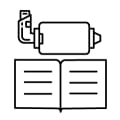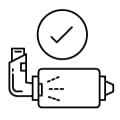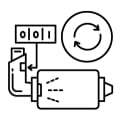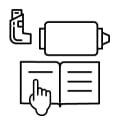Helping Your Child Use a Metered-Dose Inhaler With a Spacer: Care Instructions
A metered-dose inhaler lets your child breathe medicine directly into their lungs. "Metered-dose" means that the inhaler gives a measured amount of medicine each time your child uses it. This type of inhaler delivers medicine in the form of a liquid mist.
Using a spacer makes it easier for your child get the medicine in their lungs. A spacer is a chamber that attaches to the inhaler. The spacer holds the dose of medicine while your child inhales it.

Read the instructions that come with the inhaler and the spacer. Inhalers come in different shapes, sizes, and doses. Each kind is used differently.

Understand how to use the inhaler and spacer. Ask the nurse, doctor, pharmacist, or respiratory therapist to make sure you use it the right way.

Make sure you use the right inhaler at the right time. Label each inhaler if you have more than one.

Get inhaler refills before you run out. Use the dose counter to see how many doses are left.

Follow the instructions for cleaning the inhaler and the spacer. They will help you do it the right way for each inhaler.

Check the instructions to see if you need to prime the inhaler (get it ready) before use. If it needs priming, follow the instructions for how to do so.
How to help your child
Follow these steps for helping your child use a metered-dose inhaler with a spacer.
Shake the inhaler for 5 seconds. Remove the cap.
slide 1 of 8, Shake the inhaler for 5 seconds. Remove the cap.,
Hold the inhaler upright with the mouthpiece at the bottom. Then place the mouthpiece of the inhaler into the spacer.
slide 2 of 8, Hold the inhaler upright with the mouthpiece at the bottom. Then place the mouthpiece of the inhaler into the spacer.,
Have your child stand or sit up straight. With the spacer a short distance from their mouth, they should breathe out slowly and completely.
slide 3 of 8, Have your child stand or sit up straight. With the spacer a short distance from their mouth, they should breathe out slowly and completely.,
Have your child place the spacer's mouthpiece in their mouth. They should close their lips tightly around the mouthpiece and keep their tongue away from the opening.
slide 4 of 8, Have your child place the spacer's mouthpiece in their mouth. They should close their lips tightly around the mouthpiece and keep their tongue away from the opening.,
Have your child press down on the inhaler to spray 1 puff of medicine into the spacer. They should start breathing in slowly and deeply. Have them hold their breath for 5 to 10 seconds and then remove the spacer's mouthpiece from their mouth. Then they should breathe out slowly.
slide 5 of 8, Have your child press down on the inhaler to spray 1 puff of medicine into the spacer. They should start breathing in slowly and deeply. Have them hold their breath for 5 to 10 seconds and then remove the spacer's mouthpiece from their mouth. Then they should breathe out slowly.,
If your child needs another puff of medicine, wait 1 minute between puffs.
slide 6 of 8, If your child needs another puff of medicine, wait 1 minute between puffs.,
Remove the inhaler from the spacer, and replace their caps.
slide 7 of 8, Remove the inhaler from the spacer, and replace their caps.,
Have your child rinse their mouth with water if the inhaler has corticosteroids, such as fluticasone. (Controller inhalers usually have corticosteroids.) Do not let your child swallow the water.
slide 8 of 8, Have your child rinse their mouth with water if the inhaler has corticosteroids, such as fluticasone. (Controller inhalers usually have corticosteroids.) Do not let your child swallow the water.,
Where can you learn more?
Go to https://www.healthwise.net/patientEd
Enter D341 in the search box to learn more about "Helping Your Child Use a Metered-Dose Inhaler With a Spacer: Care Instructions".
Current as of: July 31, 2024
